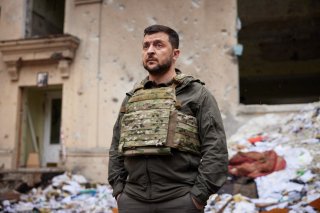Henry Kissinger and Ending the Conflict Over Ukraine
Democracy or not, if this conflict goes on much longer, Ukraine runs the imminent risk of becoming irredeemably dysfunctional once it comes to an end.
On the other hand, a growing number of leaders of European states, joined by more thoughtful commentators and analysts on both sides of the Atlantic, are now taking a more traditional view—one that goes back at least to Thucydides—which can be summarized in the following way: history never ends, the future is uncertain, one’s friends are always imperfect, power politics never go away, and no political cause is ever truly just.
One derivation of this way of thinking is that consistently guarding against the temptation to push aside the moderating insubordination of the ways of the world is neither cynicism nor appeasement; it is, rather, a commonsensical and healthy caution against championing for a world as it never could be and advocating the use of all means to get there. Quite right, because diplomacy is neither a morality play nor an exercise in telling the other side how to avoid perdition. Hence the efforts of France, Germany, Italy, and other European powers (not to mention Turkey) to keep the diplomatic channels open and mediate (or at least facilitate) a ceasefire, if not a formal peace, between Moscow and Kyiv.
At the end of the day, this will most likely either produce a frozen conflict roughly along Syria-Israeli or intra-Korean lines, or a deal involving the implementation of something akin to the Minsk Agreements, or Edward Luttwak’s three-point plan. Maybe there’s a fourth or a fifth option. Regardless, the goal of this Western faction has rightly shifted. Thanks to the West’s munificence, Ukraine has been able to demonstrate that it can resist (but not overcome) aggression; now the West must be clear that its priority is coming to terms on some sort of settlement. This will almost certainly require Kyiv to accept a compromise—an unpalatable word to the Ukraine-must-win-at-all-costs faction. This should not be interpreted as necessarily requiring Ukraine to formally sign a legal document that cedes a portion of its lands in perpetuity: we know from the conflict over Karabakh in the South Caucasus that a heroic reversal is possible, and we can point to the unresolved Kosovo case as evidently remaining a point of contention between those who champion territorial integrity as a cornerstone principle of international law and those who continue to pressure Serbia, a UN member state, into “accepting the reality on the ground.” The point is that the onset of such European conflicts and their subsequent trajectories had less to do with respecting the basic tenets of the UN Charter than geopolitical ebb and flow coupled with shifts in the balance of power.
Perhaps this maximalist faction would have more luck in convincing its recalcitrant Western allies, not to mention the rest of the world, of the sincerity of its intentions were it not for the fact that Ukraine is hardly a democracy in the usual Western understanding of the term: Freedom House calls it a “partly free” and “transitional or hybrid regime” while Transparency International ranks it as the most corrupt country in Europe.
Democracy or not, if this conflict goes on much longer, Ukraine runs the imminent risk of becoming irredeemably dysfunctional once it comes to an end—say, the Bosnia of Eastern Europe—and Russia could end up as China’s Belarus or what the Warsaw Pact states were to the Soviet Union. How could either of these scenarios, to say nothing of both, possibly be in the interest of the West?
That’s why it’s high time for the Western states that actually matter, led by the United States, to properly define their war aims and get everyone else in line. This will necessarily need to include Ukraine, whose president may have to be told in no uncertain terms that Western support for Kyiv’s maximalist warmaking and negotiation strategy is rapidly nearing its end. As Kissinger said at Davos: “one hopes that [the Ukrainians] match the heroism that they have shown in the war with wisdom for the balance in Europe and in the world at large.”
Damjan Krnjević Mišković is Professor of Practice at ADA University and oversees policy research, analysis, and publications at its Institute for Development and Diplomacy (IDD), including the editing of Baku Dialogues. He is a former senior Serbian and UN official who previously served as managing editor of The National Interest. He is also a member of the Board of Editors of Orbis. The views and opinions expressed herein are solely those of the author.
Image: Reuters.

